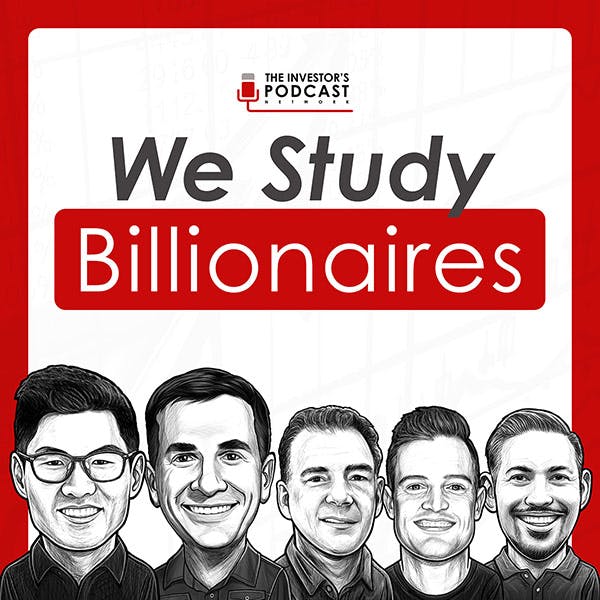
June 26, 2024 • 58min
BTC188: Claude Shannon and Information Theory with Jimmy Soni (Bitcoin Podcast)
We Study Billionaires - The Investor’s Podcast Network

Key Takeaways
- Claude Shannon developed information theory, which provides the theoretical foundation for modern digital communications and data compression
- Information theory explains how to efficiently compress and transmit information without loss of meaning. It underpins technologies like smartphones, internet, and digital media
- Shannon's work on information theory came out of his experience as a codebreaker during World War II, working on encrypted communications systems
- Shannon avoided fame and declined many speaking invitations after publishing his groundbreaking paper on information theory in 1948
- Shannon was known for his playful approach to science and life, building quirky inventions like a flame-throwing trumpet for his son
- The PayPal founding team faced numerous challenges including the dot-com crash, 9/11, and regulatory hurdles, but persevered to build a successful company
- Many PayPal founders went on to start other major tech companies like Tesla, SpaceX, LinkedIn, YouTube, and Palantir
- Elon Musk faced significant personal and professional challenges during his time at PayPal, including being ousted as CEO and losing an infant child
- The PayPal experience prepared the founders to handle adversity in their future entrepreneurial ventures
Introduction
In this episode of the Bitcoin Fundamentals podcast, host Preston Pysh interviews Jimmy Soni, author of "A Mind at Play" about Claude Shannon and "The Founders" about the early days of PayPal. They discuss Shannon's groundbreaking work on information theory and its relevance to modern technology like Bitcoin. Soni also shares insights from his extensive research and interviews for "The Founders", providing a behind-the-scenes look at the early careers of tech titans like Elon Musk and Peter Thiel.
Topics Discussed
Claude Shannon and Information Theory (2:15)
Jimmy Soni explains his motivation for writing a biography of Claude Shannon, noting there was a gap in literature about this hugely important but relatively unknown figure. He describes Shannon as a "wildly interesting person" who made contributions on par with famous scientists like Einstein, but actively avoided becoming a public figure.
- Shannon developed information theory while working at Bell Labs in the 1940s
- His 1948 paper laid the theoretical foundation for modern digital communications
- Shannon was known for his quirky inventions and playful approach to science
Explaining Information Theory (21:50)
Soni provides an overview of information theory for a general audience:
- Information theory provides a model for compressing and transmitting information efficiently without loss of meaning
- It explains how to reduce redundancy in communications, like removing vowels from words while still preserving understanding
- Shannon showed there is a theoretical limit to how much information can be compressed (the Shannon limit)
- The theory posits that the value of information is in its surprise or unpredictability, not its meaning
Soni notes: "This is effectively the theoretical plumbing for all of modern life. It affects everything from the phone calls we make to this exchange, to a video or a song."
Applications of Information Theory (28:24)
The discussion touches on how information theory applies to various fields today:
- AI and machine learning use information theory principles for data compression and prediction
- Cryptocurrencies like Bitcoin rely on information theory for efficient and secure transactions
- Genetics research applies information theory to understanding DNA encoding
Shannon's Approach to Fame and Work (31:54)
Soni describes how Shannon reacted to the acclaim following his 1948 paper:
- Shannon largely avoided public appearances and declined many speaking invitations
- He published a short paper called "The Bandwagon" urging caution about overapplying information theory
- Shannon preferred to focus on his own research and inventions rather than promoting his work
Shannon's Personal Life and Approach (41:32)
The conversation highlights Shannon's playful approach to both science and family life:
- Shannon built quirky inventions like a flame-throwing trumpet for his son's school performance
- His family used a multi-sided die to randomly assign chores
- He turned a tree on his property into a pirate flag pole "just because he thought it was funny"
Soni notes: "We all take ourselves a little too seriously. Shannon never did. It was one of those things. I still remain inspired by it."
The PayPal Story (44:53)
Soni discusses his book "The Founders" about the early days of PayPal:
- The book covers 1998-2002, a pivotal period for the company and founders
- PayPal faced numerous challenges including the dot-com crash, 9/11, and regulatory hurdles
- Many PayPal founders went on to start other major tech companies like Tesla, SpaceX, YouTube, and LinkedIn
- The book explores who these famous figures were before they became billionaires
Common Traits of PayPal Founders (48:34)
Soni identifies some shared characteristics among the early PayPal team:
- Many were building computer-related projects and businesses from a young age
- Most had started multiple businesses before PayPal
- There was a prevalence of game playing, puzzle solving, and chess among the group
Elon Musk's Early Challenges (51:27)
Soni highlights some of the difficulties Elon Musk faced during the PayPal years:
- Musk was ousted as CEO of PayPal
- He nearly died after contracting malaria and meningitis on a trip
- Musk lost an infant child to SIDS during this period
Soni emphasizes: "There's this real profound four year period of difficulty in which he struggles with the hardest thing that anyone, I think, could struggle with."
PayPal's Unlikely Success (53:28)
The conversation covers the numerous obstacles PayPal overcame:
- The company was founded just before the dot-com crash
- 9/11 led to stricter financial regulations
- PayPal faced lawsuits, hacking attempts, and fraud
- There was an intense rivalry with eBay
Soni notes: "The most surprising thing about PayPal is this company should have gone under, none of this should have happened, and it stayed alive."
Elon Musk's Work Ethic (57:46)
The discussion touches on Musk's hands-on approach and technical expertise:
- Musk has a history of deep involvement in coding and engineering dating back to his early companies
- His willingness to do whatever it takes inspires engineers to do their best work
- Musk's engineering background gives him insight into efficiency and necessary personnel when making decisions like layoffs at Twitter
Conclusion
This wide-ranging conversation covered the groundbreaking work of Claude Shannon in developing information theory, which underpins much of modern digital technology. It also provided insights into the early days of PayPal and the shared traits of its founding team who went on to shape much of the modern tech landscape. The discussion highlighted how both Shannon and the PayPal founders approached complex problems with creativity, perseverance, and a willingness to challenge conventional thinking. It also emphasized the human side of these tech pioneers, from Shannon's playful approach to life and science to the personal and professional challenges faced by figures like Elon Musk on their path to success.









